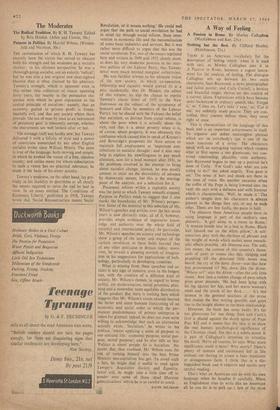The Moderates
The Radical Tradition. By R. H. Tawney. Edited feld and Nicolson, 30s.)
THE canonisation of which R. H. Tawney has recently been the victim has served to obscure both his strength and his weakness as a socialist thinker: in his ultimate perspective, he was a thorough-going socialist, not an eclectic `radical'; but he was also a less original and clear-sighted theorist than is often claimed by his admirers. Tawney's strength, which is apparent even in this rather thin collection of essays spanning forty years, lay mainly in the persuasive elo- quence with which he gave expression to the central principle of socialism: namely, that an economy geared to private profit is funda- mentally evil, and that any society where there prevails 'the use of man by man as an instrument of pecuniary gain' is inherently corrupt, whether the instruments are well looked after or not.
The message itself was hardly new, but Tawney 'delivered it with a felicity of style and a power of conviction unmatched by. any other English socialist writer since William Morris. The same is true of the language, both moving and simple, in which he evoked the vision of a free, classless society; and unlike many for whom subscription to such a vision has no practical relevance, he made it the basis of his every activity.
Tawney's weakness, on the other hand, lay pre- cisely in his inability to determine at all clearly the means required to serve the end he had in view. In an essay entitled `The Conditions of Economic Liberty,' published in 1918, Tawney wrote that `Social Reconstruction means Social
Revolution, or it means nothing.' He could well argue that the path to,social revolution he had in mind lay through social reform, State inter- vention in economic life and the nationalisation of some basic industries and services. But it was rather more difficult to argue that this was the social revolution. Yet, two of the essays reprinted here and written in 1949 and 1952 clearly show, as does his very moderate position in the inter- war politics of the Labour Party, that Tawney never went much beyond marginal collectivism.
He was faithful always to his ultimate vision of the new society, in which co-operation, fellowship and equality would prevail (it is a pity, incidentally, that Dr. Hinden, the editor of this volume, let slip the chance to reprint Tawney's classic letter of 1935 to the New Statesman on the subject of the acceptance of honours and titles by members of the Labour Party); but he shared with the Fabians the belief that socialism, as distinct from social reform, is about the poor when it is actually about the rich, and that it is about poverty when it is, of course, about property. It was obviously this confusion which caused him to speak of Keynes's and Beveridge's proposals for State action to maintain full employment as 'important con- tributions to socialist thought': and it also may help to explain his unwillingness to pay much attention, save for a brief Moment after 1931, to the problems involved in the attempt to bring about socialist change; instead, he was mostly content to insist on the desirability of advance by democratic means; but this is the starting- point of the analysis, not a substitute for it.
Piecemeal reform within a capitalist society was the point at which Tawney uneasily stopped. Purpose in Politics tends to suggest that it also marks the boundaries of Mr. Wilson's perspec- tive. Some of the material in this selection of Mr. Wilson's speeches and articles over the last seven years is now distinctly stale; all of it, however, provides ample evidence of impressive know- ledge and authority over the whole field of national and international policy. In particular, Mr. Wilson's speeches on science and technology show a grasp of the scope and impact of the current revolution in these fields beyond that of any other politician in Britain today; more- over, he reveals a pleasing warmth of imagina- tion in his suggestions for applications of tech- nology, particularly in developing countries.
What is missing from these speeches and ar- ticles is any sign of concern, even in the longest run, with the creation of a different kind of society. Mr. Wilson's themes, in regard to home policy, are modernisation, social priorities, plan- ning and a somewhat more equitable distribution of the product. But there is nothing here which suggests that Mr. Wilson's vision extends beyond the better and more humane functioning of an economic and social order in which the per- manent predominance of private enterprise is taken for granted; indeed, he does not even seem willing to acknowledge that such an alternative actually exists. 'Socialism,' he writes in his preface, `means applying a sense of purpose to our national life: economic purpose, social pur- pose, moral purpose'; and he also tells us that `Politics is about people. So is Socialism.' No doubt. But, thus confined, Mr. Wilson runs the risk of turning himself into the best Prime Minister neo-capitalism has got. To avoid such a fate, he might find it useful to read again Tawney's Acquisitive Society and Equality; better still, he might take a little time off to ponder over some of those `dead Marxian generalisations' which he is so careful to scorn.
RALPH MILIBAND


































 Previous page
Previous page